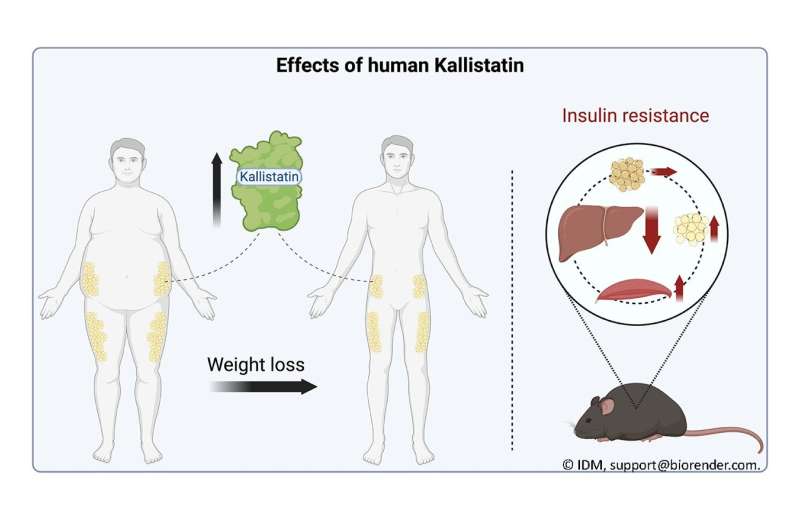This article has been reviewed according to Science X's editorial process and policies. Editors have highlighted the following attributes while ensuring the content's credibility:
fact-checked
peer-reviewed publication
proofread
Kallistatin found to contribute to the beneficial metabolic effects of weight loss

After weight loss, people who are overweight and obese express more of the protein Kallistatin* in subcutaneous white adipose tissue. This was demonstrated by researchers from the DZD in a recent study. In addition, Kallistatin improves metabolism and could open up new therapeutic options for people with obesity and type 2 diabetes in the future. The results have now been published in Molecular Metabolism.
An increasing number of people are developing type 2 diabetes and obesity. These are highly complex and multifaceted diseases. In order to treat them sustainably, new approaches to therapy are needed. Clinical studies on humans have shown that heavily overweight individuals produce less Kallistatin.
Kallistatin is a protein that has various effects on the body. Among other things, it is involved in counteracting inflammation and healing wounds. The role that Kallistatin plays in glucose metabolism and its potential suitability as a therapeutic target are currently being investigated by researchers from the German Center for Diabetes Research (DZD), the Institute for Diabetes Research and Metabolic Diseases (IDM) of Helmholtz Munich at the Eberhard-Karls-University of Tübingen, and the Department of Diabetology, Endocrinology and Nephrology at the University Hospital Tübingen.
To this end, they measured Kallistatin expression in subcutaneous white adipose tissue in 47 individuals with overweight to obesity before and after weight loss. The result: Kallistatin expression increases after weight loss.
Additionally, the researchers examined the effect of the protein in an animal model. In the process, they observed that human Kallistatin improves hepatic insulin sensitivity in diet-induced obese mice.
"Our results suggest that Kallistatin may be an interesting, yet challenging, therapeutic target for people with obesity and insulin resistance," says lead author Leontine Sandforth.
"Because Kallistatin has insulin-sensitizing effects in the liver, it should be investigated as a potential liver-specific target for emulating the beneficial effects of weight loss and potentially treating type 2 diabetes and obesity," adds last author Prof. Andreas Birkenfeld.
More information: Leontine Sandforth et al, Role of human Kallistatin in glucose and energy homeostasis in mice, Molecular Metabolism (2024). DOI: 10.1016/j.molmet.2024.101905





















